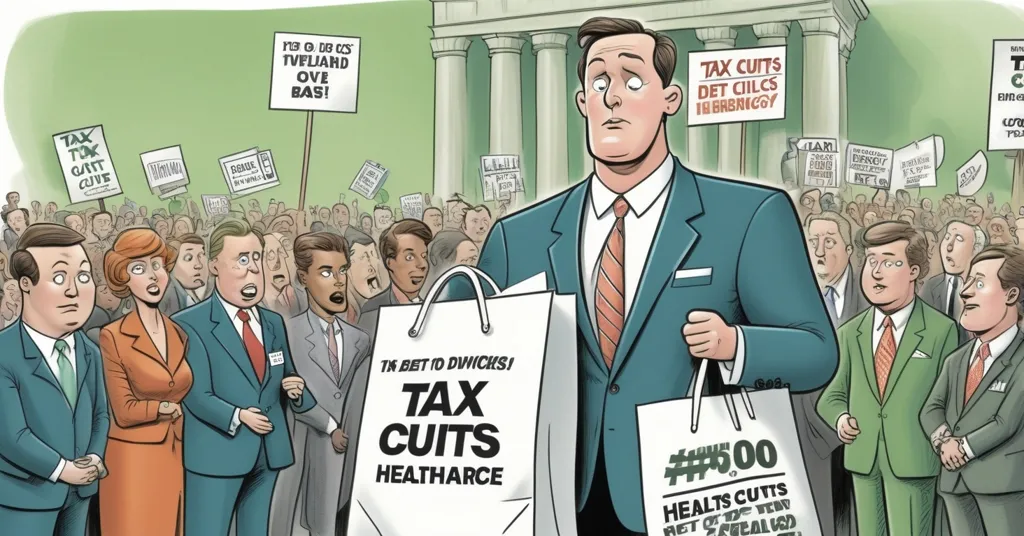Elizabeth Warren Blasts GOP Tax Bill: Health Care at Risk for Millions

Elizabeth Warren Slams Republican Tax Bill as ‘Giveaway’ to the Wealthy
Senator Elizabeth Warren has fiercely criticized a Republican-led tax bill, calling it a massive giveaway to the richest Americans that could jeopardize health care for millions. As the House Ways and Means Committee pushes forward with the legislation, the looming deadline to manage national debt adds urgency to the contentious debate.
- Warren criticizes tax bill as favoring the wealthy
- Potential health care impact for millions
- Extension of Trump’s tax cuts proposed
- Elimination of green energy projects
- Urgency due to national debt deadline
The tax bill, part of former President Trump’s economic strategy, aims to extend the tax cuts from his first term, set to expire at the end of 2025. It also introduces new tax breaks for workers, retirees, and private schools. However, the bill proposes the elimination of green energy initiatives established by the Biden administration, stirring significant controversy.
Elizabeth Warren’s Critique of the Republican Tax Bill
Elizabeth Warren has been vocal about her opposition to the bill. She warns that it could lead to 14 million Americans losing health care, stating,
“Republicans in Congress want to pass giant tax giveaways for the wealthiest Americans while ripping away health care from 14 million people across this country. Cutting health care for babies to make a handful of billionaires even richer.”
Her critique underscores the bill’s potential to increase the gap between rich and poor and undermine public health services. Warren’s criticism aligns with her broader tax policy statements.
Simultaneously, another committee discussed a Republican proposal to tighten Medicaid eligibility. This could remove 7.7 million people from the program and save $715 billion, according to the Congressional Budget Office. The State and Local Taxes (SALT) deduction, which allows taxpayers to deduct certain taxes paid to state and local governments from their federal income tax, currently has a $10,000 cap set to expire in 2025. The bill proposes changes to this deduction, further fueling the debate.
Impact on Health Care and Green Energy
The potential health care cuts proposed in the bill align with Warren’s concerns. The tightening of Medicaid eligibility could significantly affect access to health care for millions of Americans. On the environmental front, the bill’s plan to eliminate green energy initiatives poses a risk to projects aimed at combating climate change, which were implemented under the Biden administration. The impact on health care and Medicaid is a major point of contention.
Debt Ceiling Urgency
The urgency to pass the bill is driven by an impending deadline to manage the national debt. Treasury Secretary Scott Bessent has warned of a potential default that could threaten the global economy. The current national debt stands at a staggering $36.2 trillion, and the bill could add trillions more to this figure. The federal government is currently operating under a continuing resolution through March 14, 2025, without a provision to raise the debt limit, adding pressure to the legislative process.
Public Reaction
On social media, some users have pushed back against Warren’s characterization of the tax plan. One X user stated,
“Letting people keep their own money is not a ‘giveaway.’ That’s some Orwellian terminology. Keeping rates where they currently are is also not a ‘giveaway.'”
This sentiment reflects a broader divide in public opinion over the bill’s implications and terminology. Republicans argue that the bill allows individuals to retain their earnings, rather than providing a ‘giveaway’ to the wealthy. Discussions on platforms like Reddit highlight the public’s varied reactions to the proposed changes.
The tax bill remains a flashpoint in the ongoing ideological battle between Republicans and Democrats. The urgency driven by the national debt deadline adds pressure to an already contentious debate, raising critical questions about the future of tax policy, health care, and economic equity in the United States. The national debt deadline urgency and tax bill are central to the current political discourse.
Key Takeaways and Questions
- What is the main criticism of the Republican tax bill according to Elizabeth Warren?
Elizabeth Warren criticizes the bill for providing tax breaks to the wealthiest Americans while potentially cutting health care for millions.
- What changes does the tax bill propose regarding previous tax cuts and new tax breaks?
The bill aims to extend Trump’s first-term tax cuts and introduce new tax breaks for workers, retirees, and private schools.
- How does the bill plan to affect green energy initiatives?
It plans to eliminate green energy projects implemented by the Biden administration.
- What is the proposed change to Medicaid eligibility, and what are its projected impacts?
The bill proposes tightening Medicaid eligibility, potentially removing 7.7 million people from the program and saving $715 billion.
- What is the current status of the SALT deduction, and what changes are being considered?
The SALT deduction currently has a $10,000 cap set to expire in 2025. The bill proposes raising this cap for those with a modified adjusted gross income of $400,000 or less.
- Why is there urgency in passing the tax bill?
The urgency stems from an impending deadline to manage the national debt, with potential economic consequences if not addressed by mid-July.
- How have social media users responded to Elizabeth Warren’s statements on the tax bill?
Some users have challenged her characterization of the tax plan as a “giveaway,” arguing it’s about allowing individuals to keep their earnings.



